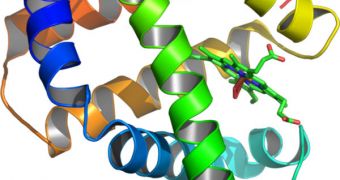A group of researchers from the Princeton University announces the development of the first artificial proteins, which have been proven to enable the growth of living cells in lab experiments. The groundbreaking achievement could change the face of medicine, experts believe.
What the scientists did was basically construct a number of genetic sequences that have never been identified as occurring in nature. These sequences were then showed capable of producing substances that enabled the survival of cells as if they were produced naturally.
The investigators were led by Princeton University professor of chemistry Michael Hecht, and they were able to design the artificial proteins – a world first – starting from scratch. They were expressed from artificial genes, the team adds, which is an achievement in itself.
These molecules the researchers created are bound to cause quite a stir in the area of synthetic biology, a developing field of research that holds great promise for advancing medicine and biotechnology.
“What we have here are molecular machines that function quite well within a living organism even though they were designed from scratch and expressed from artificial genes,” explains Hecht.
“This tells us that the molecular parts kit for life need not be limited to parts – genes and proteins – that already exist in nature,” the team leader adds. This type of thinking is precisely the reason why synthetic biology is getting this much attention lately.
Experts are fascinated by the possibility of designing and fabricating the biological components and systems needed to support life from scratch, as a test of their abilities, and also of their understanding of how these systems interact to underlie life.
Among the primary objectives in synthetic biology today, experts include the design and construction of an artificial genome that will include unique patterns of chemicals, not found in nature.
“Our work suggests that the construction of artificial genomes capable of sustaining cell life may be within reach,” Hecht explains, quoted by SpaceRef.
Details of the new synthetic proteins were published online in the January 4 issue of the esteemed journal Public Library of Science ONE, a peer-review scientific magazine.
“What I believe is most intriguing about our work is that the information encoded in these artificial genes is completely novel – it does not come from, nor is it significantly related to, information encoded by natural genes, and yet the end result is a living, functional microbe,” adds Michael Fisher.
“It is perhaps analogous to taking a sentence, coming up with brand new words, testing if any of our new words can take the place of any of the original words in the sentence, and finding that in some cases, the sentence retains virtually the same meaning while incorporating brand new words,” he adds.
The expert is one of the coauthors of the PLoS ONE paper. He got his PhD at Princeton in 2010, and is now a postdoctoral fellow at the University of California in Berkeley (UCB). The scientist worked with Hecht on the synthetic proteins.
The group received funds from the US National Science Foundation (NSF) for the investigation.

 14 DAY TRIAL //
14 DAY TRIAL //